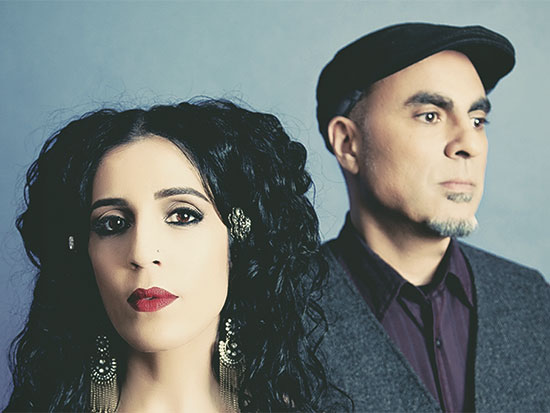 The University of Alabama at Birmingham’s Alys Stephens Performing Arts Center will present a free performance by global electro-acoustic outfit Niyaz featuring Azam Ali at 7 p.m. Thursday, April 20.
The University of Alabama at Birmingham’s Alys Stephens Performing Arts Center will present a free performance by global electro-acoustic outfit Niyaz featuring Azam Ali at 7 p.m. Thursday, April 20.
The free show is part of IndiaFest, a more than monthlong celebration honoring Birmingham’s vibrant Indian culture that features events across campus and throughout the city. Explore all the scheduled events, most of which are free, at AlysStephens.org/Indiafest.
Niyaz has become an evolutionary force in contemporary Middle Eastern music by seamlessly blending medieval Sufi poetry and folk songs from the duo’s native Iran and surrounding Persian Gulf countries with rich acoustic instrumentation and state-of-the-art modern electronics. The duo’s three best-selling albums have debuted at No. 1 on iTunes and garnered the band an incredible amount of media attention.
For its Alys Stephens Center performance, Niyaz will present “The Fourth Light Project,” an immersive multimedia experience.
Niyaz breaks new ground with “The Fourth Light,” a far-reaching album that defies most standards of world music and makes a bold statement to a global audience. Mixed by Grammy-nominated producer and electronic musician Damian Taylor (Bjork, The Killers, Arcade Fire), the album unveils nine compelling songs featuring exotic rhythms, outstanding acoustic performances and the bewitching melancholy of front woman Ali’s voice, all seamlessly blended together into a sleek production of richly textured arrangements, sweeping choruses and electronic beats that make their music both authentic and unimpeachably original.
Lead singer, co-composer and co-producer Ali for the first time takes on the role of electronic musician and programs all the beats for the album, a towering achievement for a woman who is recognized mostly for her spellbinding voice, featured in some of the biggest Hollywood film and television scores, according to the group’s bio.
In can be said that “The Fourth Light” is in many ways a feminist album, according to Ali. The central figure who served as the main source of inspiration for the music is the first female Sufi mystic and poet, Rabia Al Basri, who was born in the eighth century in Iraq. She was born into extreme poverty during a time when women’s rights were severely constrained. Sold into slavery at a young age, Rabia defied the odds and managed to find the inner strength and resolve that would eventually lead to her liberation both as a woman and as a spiritual figure.
Rabia’s struggles even in the eighth century remain quite relevant to our time, when women continue to strive to rise above the status of inferiority placed upon them by many patriarchal societies around the world, Azam says.
To further drive home the cry for gender equality is the song “Aurat (Woman),” based on a visionary poem by Kaifi Azmi, one of the most progressive Urdu poets of the 20th century. The poem, composed for his wife in the 1940s, called for women to stand shoulder to shoulder with men, during an era when women lived in very traditional societies in an India that was still not independent.
There is a deep social conscience woven into the music of Niyaz. Though many of their songs are original compositions based on or inspired by ancient poetry of the great Eastern mystics, a large part of their repertoire is derived from traditional folk songs of ethnic and religious minority groups in the Middle East who have suffered great oppression. The new album features five folk songs, “Shir Ali Mardan (Song of a Warrior),” from the Bakhtiari region of Iran; “Yek Naza (A Single Glance),” from Khorassan, Iran; “Eyvallah Shahim ‘new rendition’ (Truth),” from the Alevi-Bektashi tradition in Turkey; and “Sabza Ba Naz (The Triumph of Love)” and “Khuda Bowad Yaret (Divine Companion)” from Afghanistan.
The message of hope against oppression and the need for unity remain pivotal to the band. Their sublime, ever-evolving mix of poetry and song is delivered through music that is both uplifting and transformative.
“It’s a daring task to try to bridge the chasm between peoples,” Ali said. “But if we can make that happen even for the one hour that people are there just to listen to our music, then who’s to say we did not triumph in our goal?”
